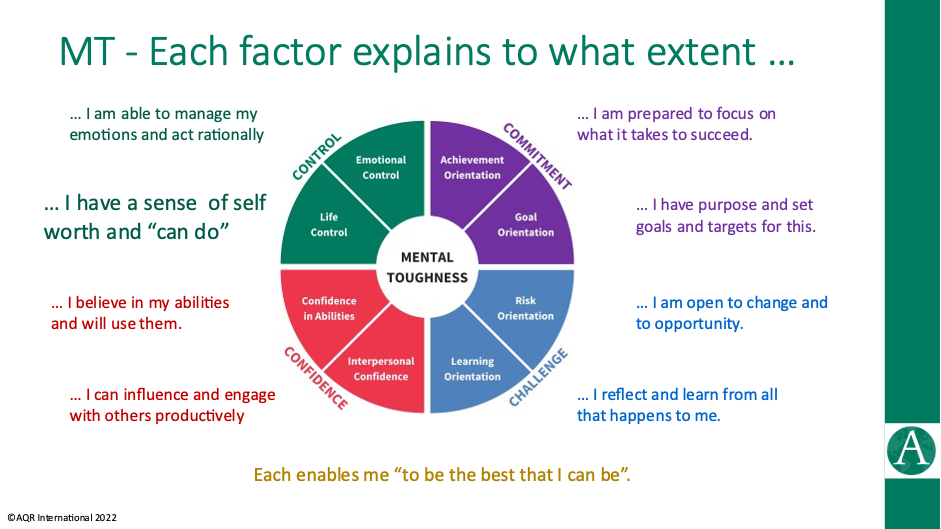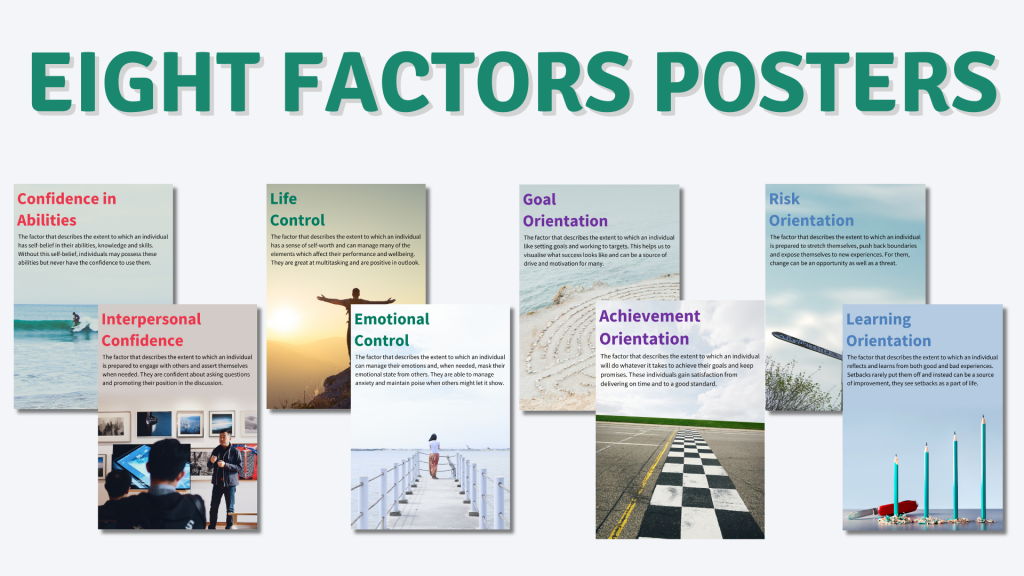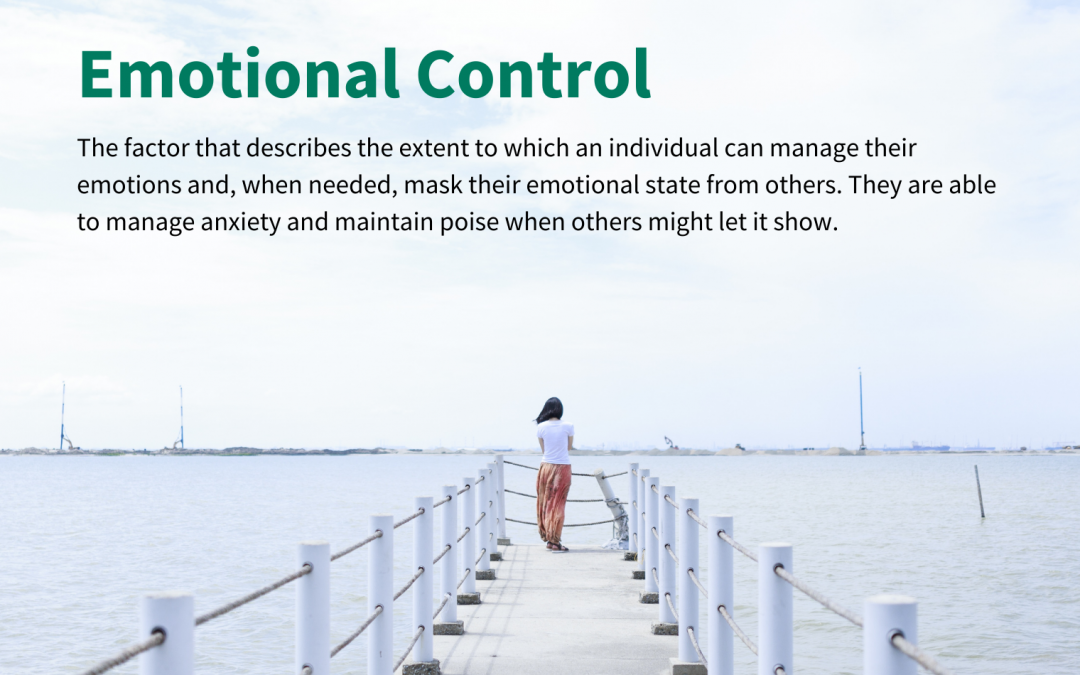How can I manage my emotional responses and those of others?
The second in a series of posts about the 8 factors that form the mental toughness concept. Mental toughness is a personality trait that describes our mental responses, how we think, to stressors, challenges and opportunities that make up our life and work experiences.
Fundamentally important, it is a major influence on our behaviour – how we act.
Emotional Control is one of the two factors that contribute to our overall sense of Control. It describes the extent to which we are able to manage our emotions as well as influencing the emotional responses of others.
It is perhaps more accurate to describe this as emotional management.
We all experience emotions. When something pleases us, we are happy. When something annoys us, we can get angry. So, we can often see the manifestation of this mental response in eight distinct, basic human emotional behaviours: happiness, sadness, fear, anger, disgust, surprise, acceptance, and anticipation.
But it is possible for two people, who are broadly equivalent, to reveal different emotions when exposed to the same trigger. Even though the trigger might be an irritant for both, one will show anger and frustration whereas the other will maintain poise.
The difference lies in their respective mental approaches.
This can be significant for well being and performance. Although we all experience emotions, and even where a particular emotion might not be a surprise, it is not always helpful to reveal that.
Conversely, it can be useful to feel that you should show an emotional response (for example, to show interest) even when that is not how you are feeling.
Of equal significance is that this sense that emotional control can also influence, or even determine, the extent to which you allow your emotions to influence your decisions and the resulting actions.
This essentially determines whether you allow your emotions to dictate your behaviours or whether you can channel your emotions into productive or beneficial behaviour.
This factor, like all the factors, is a spectrum with mental sensitivity at one end and mental toughness at the other. It is not a black and white idea – there are many shades in between. In fact, around 70% of a population will have mental responses that reflect elements of both.
And, although each of the 8 factors are independent of each other, the way they can interplay will create different outcomes. There are at least 40,000 possible combinations at a base level.
So, two people, who are similar in terms of Emotional Control, might differ in their response to tasks if one has a high level of, say, interpersonal confidence (and is able to deal with difficult people) and the other has a low level (and cannot deal with difficult people).
This illustrates that personality is complex and nuanced and how the mental toughness concept (and the MTQPlus) measure can bring that nuance to the practitioner.
The image helps us to get an insight into this. Think about how different of levels of Life Control might result in different outcomes with different levels of the other seven factors.

There is another layer of complexity to consider. All things being equal, being more mentally tough will give an advantage to the individual. But not always.
It is perfectly possible for a mentally tough person to struggle and for the more mentally sensitive to thrive. The key is self-awareness – about how they are responding in their head. Ordinarily this is invisible which is a major challenge for the practitioner and the individual.
If self-aware about one’s level of mental toughness, one can either develop it or one can adopt practices that help to compensate for the level of sensitivity.
This is the essence of coaching. Understanding what make you tick and what gets in the way.
How can a mentally tough person struggle? The sense of emotional control can result in being difficult to “read” – body language does not align with the oral message; appearing dispassionate; unflappability and poise confuses others – does the person understand how serious the problem is? And their poise can stress others.
What are the positives for a more mentally sensitive person in terms of Life Control? You will often get what you see, their enthusiasm can be infectious (so can their down times!), Thery can be empathetic in a way a more mentally tough individual might not be (although they can be compassionate) and can adopt a different caring approach which can be useful.
Give this degree of nuance is true for all eight factors and that all with one another, we now have a lens through which we can help people to look at themselves with all the complexity involved and understand exactly where their development needs might lie.
This illustrates that the mental toughness concept is about differences and not about “good or bad” or labelling people as types or colours. We are all remarkably different and similar.
There is evidence emerging that “one size fits all” approaches although targeted at individuals fail and can do more harm than good because they are not customised.
Assessment is a challenge. Because the factors are invisible and any one, or combination of factors, can be the explanation for a behaviour or wellbeing outcome, it can be exceedingly difficult to assess someone’s mental toughness profile with a realistic level of confidence. Fortunately, a by-product of the considerable research behind the concept has resulted in the development of a reliable and valid psychometric measure that assesses this and the other factors with a high re degree of reliability and validity.
The mental toughness concept and the MTQPlus measure represents a real advance in our understanding of individuals (and organisations). For practitioners who are in engaged in developing people and organisations, understanding mental toughness goes beyond CPD. It should really be part of their armoury.
Like the image used in this post on Life Control and others in our ‘Eight Factors’ series? A set of downloadable posters are available here.



